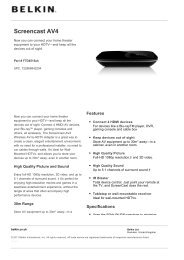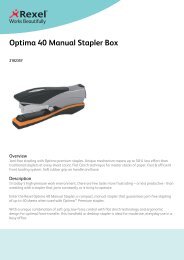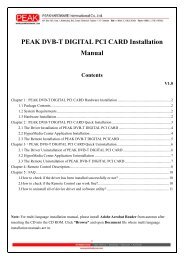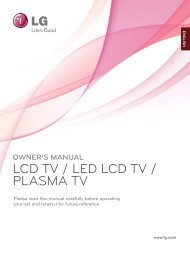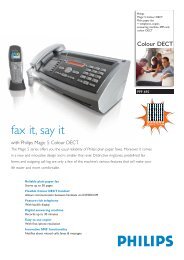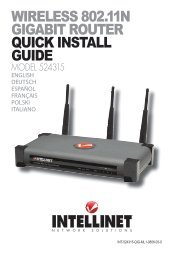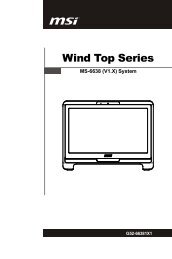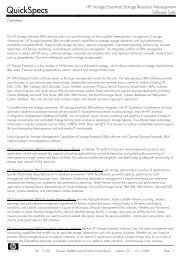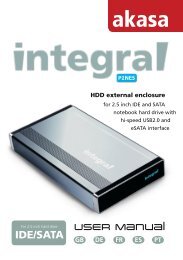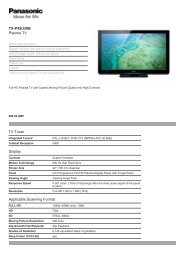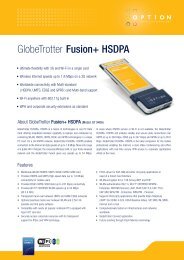Nortel Metro Ethernet Services Unit portfolio
Nortel Metro Ethernet Services Unit portfolio
Nortel Metro Ethernet Services Unit portfolio
Create successful ePaper yourself
Turn your PDF publications into a flip-book with our unique Google optimized e-Paper software.
performance dictated by their service<br />
contracts on an end-to-end basis. By<br />
assigning different service class levels to<br />
traffic flows, applications can be given<br />
the bandwidth and network priority<br />
required when and where they need it.<br />
The MESU provides the performance<br />
and QoS features to support the<br />
requirements of delay-sensitive applications.<br />
Four priority egress queues form<br />
the basis of MESU 1800 traffic management<br />
functionality, while the MESU<br />
1850/1860/1880 supports eight egress<br />
queues. With the ability to classify<br />
traffic based on IEEE 802.1Q/p and<br />
DiffServ markings and prioritize them<br />
accordingly, delay-sensitive applications<br />
can be given priority across the access.<br />
With the MESU’s support of multiple<br />
classes of services and QoS prioritization,<br />
providers are able to ensure consistent<br />
QoS to meet their customers’ SLA<br />
requirements.<br />
Network and service<br />
management<br />
The <strong>Metro</strong> <strong>Ethernet</strong> <strong>Services</strong> <strong>Unit</strong>s<br />
(MESUs) are designed for ease of use to<br />
simplify overall network operations and<br />
minimize the service provider’s ongoing<br />
OPEX. MESUs can be configured<br />
quickly with minimal manual intervention,<br />
decreasing implementation times<br />
and reducing the risk of errors. The<br />
MESU is fully manageable, both in or<br />
out of band, with SNMP applications,<br />
including <strong>Nortel</strong>’s advanced <strong>Metro</strong><br />
<strong>Ethernet</strong> Manager (MEM).<br />
MEM provides both network element<br />
and service management for the MESU<br />
<strong>portfolio</strong>, MERS 8600 and other <strong>Nortel</strong><br />
<strong>Metro</strong> <strong>Ethernet</strong> platforms. MEM<br />
provides capabilities ranging from<br />
central device management for software<br />
distribution to end-to-end service provisioning<br />
across the metro network, and<br />
the delivery of network fault, inventory<br />
and provisioning information via stan-<br />
4<br />
dard northbound interfaces to higherlevel<br />
OSS systems. With MEM, <strong>Nortel</strong><br />
is leveraging the expertise and knowledge<br />
gained with circuit-based network<br />
operations to deliver a consistent operational<br />
model across Layer 0, Layer 1 and<br />
Layer 2.<br />
<strong>Nortel</strong> also provides high-value management<br />
applications that offer comprehensive<br />
and deterministic services<br />
management. With the network and<br />
service viewer feature, providers have a<br />
proactive service assurance solution with<br />
<strong>Ethernet</strong> OAM instrumentation and<br />
advanced multi-layer troubleshooting.<br />
This provides deterministic customer<br />
and/or service impact assessment, with<br />
fault isolation and full troubleshooting<br />
capabilities across both <strong>Ethernet</strong> and<br />
optical-based domains. MESU provides<br />
support for IEEE 802.1ag — a key<br />
<strong>Ethernet</strong> OAM standard for Layer 2<br />
connectivity and fault management that<br />
provides valuable tools for verifying the<br />
availability of end-to-end <strong>Ethernet</strong> services.<br />
This MESU-supported capability is<br />
highly beneficial to service providers<br />
offering <strong>Ethernet</strong> access services, by<br />
allowing them to perform remote diagnostics<br />
on devices deployed as CLE or<br />
in outside plant locations, minimizing<br />
the need for costly truck rolls.<br />
Another key differentiator is <strong>Nortel</strong>’s<br />
<strong>Ethernet</strong> VPN management solution:<br />
VPN Continuity Check — a powerful<br />
service assurance and debugging tool<br />
critical for measuring and validating<br />
customers’ SLAs. It may be used to validate<br />
all VPN end-points, test connectivity<br />
and determine roundtrip delay<br />
measurements per VPN. This information<br />
is used by network management to<br />
verify that SLA parameters are being<br />
achieved and to generate a trend of the<br />
service report over time. This tool allows<br />
service providers to detect problems<br />
before customers notice any service<br />
degradation, isolating problems quickly<br />
and methodically. By verifying not only<br />
the integrity of the path all the way to<br />
the customer-facing port, but the total<br />
delay incurred, this capability allows for<br />
true end-to-end SLA verification.<br />
Multiple platform options<br />
to choose from<br />
<strong>Nortel</strong> offers a broad <strong>portfolio</strong> of <strong>Metro</strong><br />
<strong>Ethernet</strong> <strong>Services</strong> <strong>Unit</strong> (MESU) platform<br />
options to address the diverse<br />
application and deployment needs of<br />
<strong>Ethernet</strong> service providers. These platform<br />
options provide <strong>Ethernet</strong> connectivity<br />
ranging from 10 Mbps to 10 GE,<br />
for support over a variety of fiber and<br />
copper access topologies. Product<br />
options available include:



